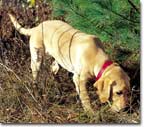Feces: A Source of Diseases for Your Dog
 Dogs smell it, roll in it, walk in it, even ingest it. And, oftentimes,
pick up serious diseases from it. Animal feces are one of the most common
sources of the following diseases:
Dogs smell it, roll in it, walk in it, even ingest it. And, oftentimes,
pick up serious diseases from it. Animal feces are one of the most common
sources of the following diseases:
Parvo Virus is one of the deadliest diseases in the dog population, particularly among puppies. Gaining entry through the mouth, the virus attacks the digestive tract and kills cells that are critical in the absorption of nutrients. Severe fluid loss through diarrhea and vomiting can lead to death. Parvo also temporarily affects a dog's immune system and can lead to heart failure in some young dogs.
Whipworms are blood suckers, tunneling into the wall of the intestine for their blood meals. Vomiting, diarrhea, and weight loss are common symptoms, and in large numbers, these parasites can cause anemia. Difficult to diagnose, they are even harder to eliminate because they are often present in very large numbers.
Hookworms are blood suckers attaching to the intestinal wall where they suck plugs of the intestinal tissue into their mouth structures. Anemia and/or intense inflammation can result. Hookworm infections can be passed to humans.
Roundworms (ascarids) can affect the lungs and the digestive system, with typical signs being vomiting and diarrhea. Convulsions can occur with heavy infections and the disease can spread to humans.
Giardia are one-celled parasites that can cause diarrhea in dogs and cats. Infection with Giardia is often difficult to diagnose and treat effectively.
The best way to prevent these, and the many bacterial infections dogs can acquire from stools, is to remove feces at least weekly (more often if possible) and keep current on your vaccinations, fecal examinations and deworming. Also pick up waste before a rain which breaks up or scatters the feces and allows the worms or germs to spread into the environment.
Here are some drugs that are used in treatment. They are dispensed for treatment of worm, giardia and symtoms associated with diarrhea. Please make sure you have your vet check the stools and do not self treat your pet without confirmation of a specific disease. Click here to find out more about these specific drugs in the article on giardia written by Drs. Foster and Smith.
Metronidazole (Flagyl) Dog, cat Dogs: 11.5 mg/lb twice daily for 5 days. Cats:5.5-11.5 mg/lb twice daily for 5 days. Do not give to pregnant animals, puppies or kittens.
Quinacrine hydrochloride (Atabrine) Dog, cat 3 mg/lb twice daily for 5 days. Do not give to pregnant animals, puppies or kittens.
Albendazole (Valbazen) Dog, cat 11.5 mg/lb twice daily for 2 days. Do not give to pregnant animals, puppies or kittens.
Fenbendazole (Panacur) Dog, not evaluated in cats Dogs: 22.5mg/lb once daily for 3 days. Do not give to pregnant animals. Safe in puppies 6 weeks or older
Furazolidine (Furoxone) Cat 2mg/lb twice daily for 5-10 days. Do not give to pregnant animals, puppies or kittens.
Praziquantel/ pyrantel pamoate/ febantel (Drontal)
Dog Use manufacturer’s suggested dosage Do not give
to pregnant animlas. (puppies must be 3 weeks old and weigh
more than 2 pounds)
This article is from Drs. Foster and Smith at www.peteducation.com